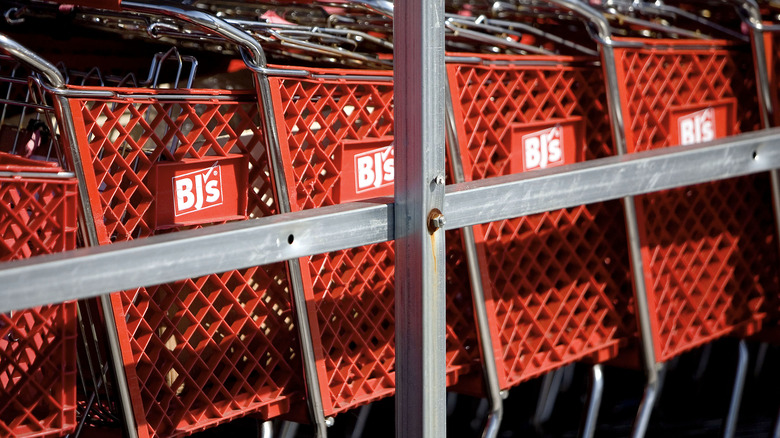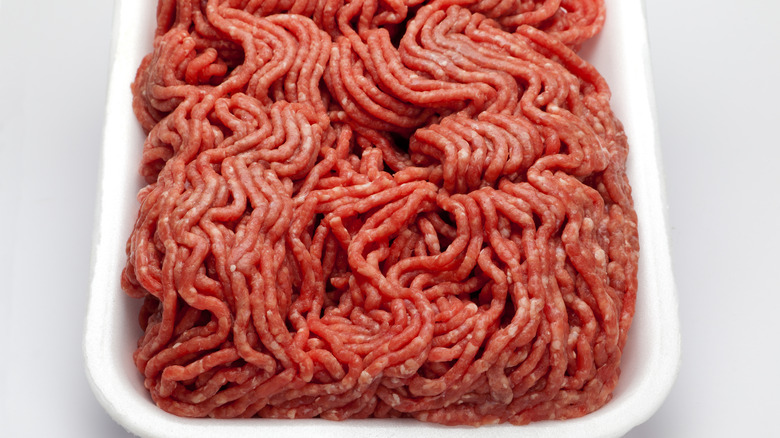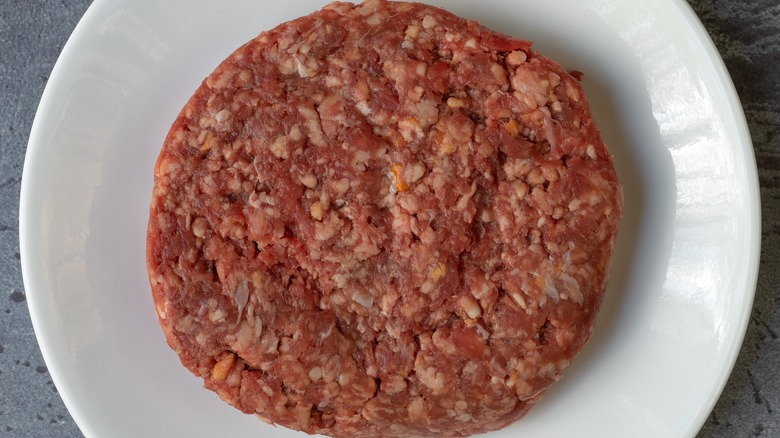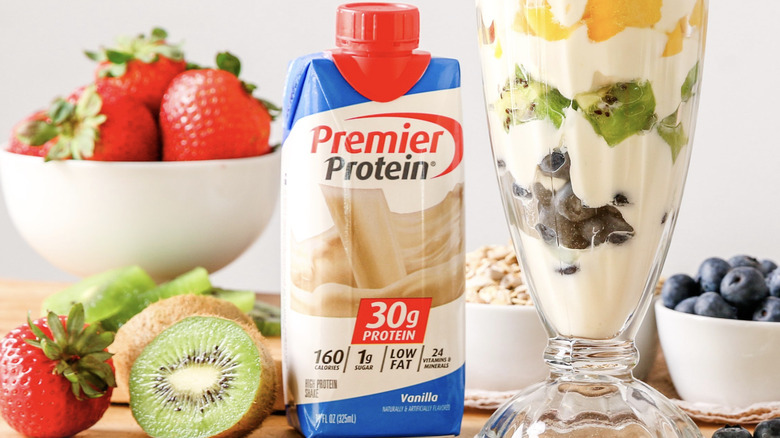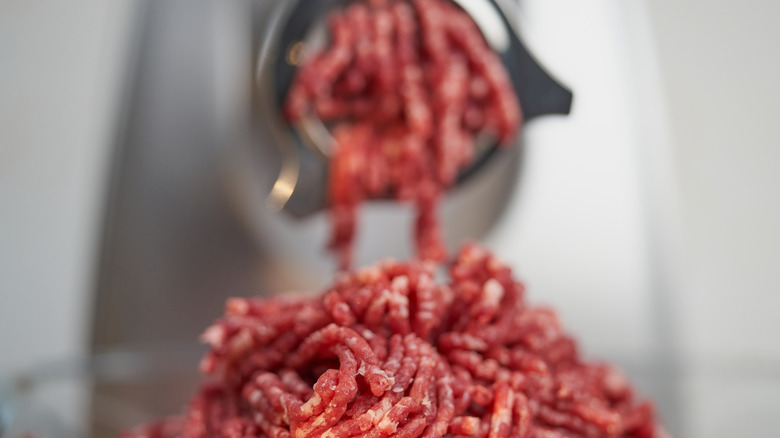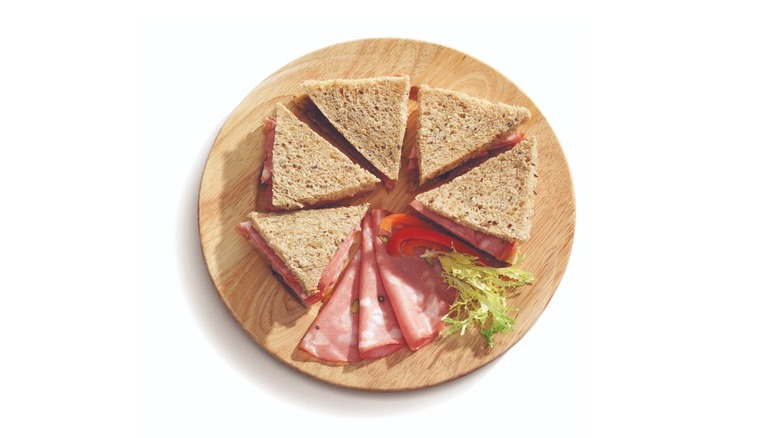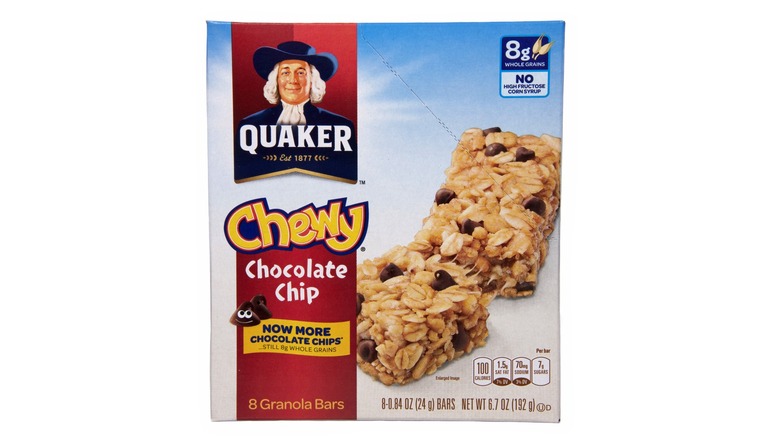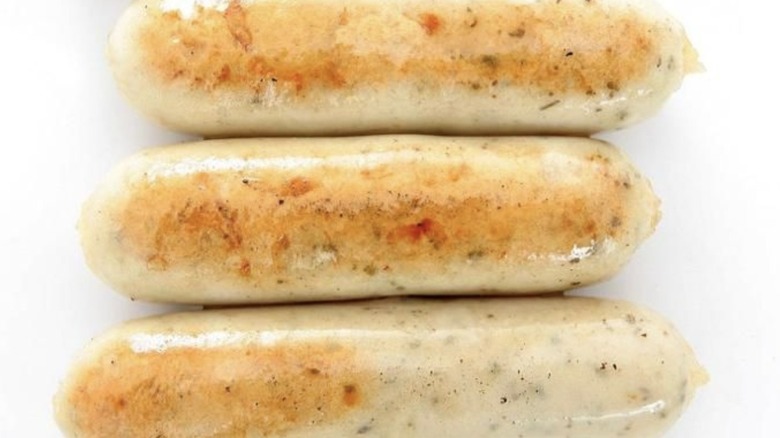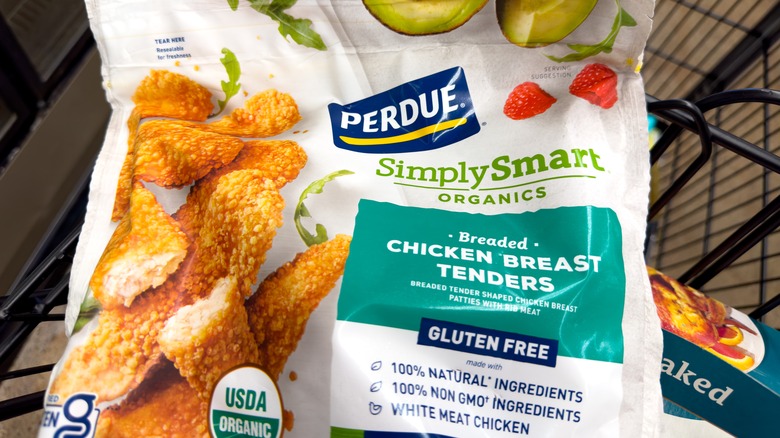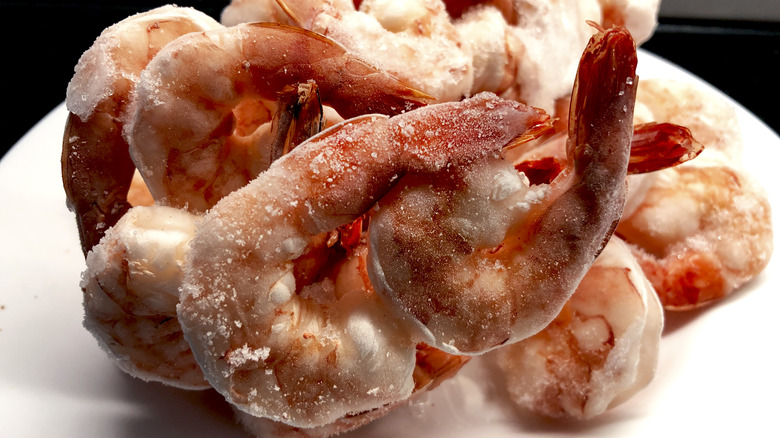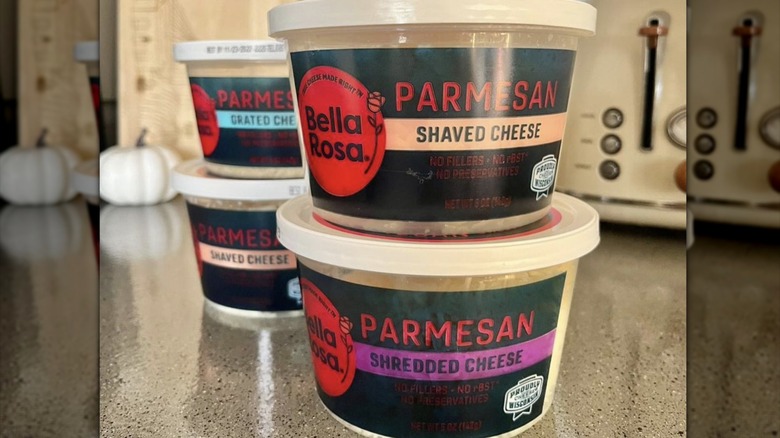The Biggest Food Recalls In BJ's Wholesale Club History
Food recalls can be unnerving to shoppers — especially when one is issued at your favorite store. Fans of BJ's Wholesale Club know the feeling all too well. BJ's is one of the biggest warehouse club stores on the East Coast, offering its members (all 7 million or so of them), savings on bulk-packaged products. When a food item that's sold in bulk gets hit with a recall, it can easily cause large-scale levels of waste and pose a serious public health threat to consumers. Like many grocery stores, BJ's has contended with a lot of food recalls. The ones on this list were some of the biggest in the chain's history.
BJ's works with various food manufacturing companies to keep its shelves stocked, meaning that if something goes amiss at even one distribution site, it can trigger a food recall at one or more BJ's locations. Recalls are either issued voluntarily by the companies that sell the product or mandated by government agencies like the Food and Drug Administration (FDA) or the U.S. Department of Agriculture (USDA). Common reasons for a food recall are contamination by pathogens or mislabeled packaging.
Food recalls are never a good look for a manufacturing plant or the store selling the goods, but the reality is that they do happen and addressing them can save lives. BJ's has mostly handled food recalls responsibly, but there has been some controversy in the past. These are some of the biggest food recalls to ever hit BJ's aisles.
Wellsley Farms Assorted Mini Quiche
Trouble hit BJ's frozen food section in late December 2023 when Fillo Factory Inc. issued a recall on mini quiches it sells under the BJ's brand name of Wellsley Farms. Fillo Factory, a manufacturer based in Northvale, New Jersey, cooperated with the FDA to voluntarily recall Wellsley Farms Assorted Mini Quiches due to a possible foreign material being present in the product. The foreign contaminant in question was aluminum.
BJ's issued a public recall notice for the quiches on January 19, 2024. The notice specified that the aluminum-tainted hors d'oeuvres were sold in stores between December 19, 2023 and December 28,2023 (the fact that this happened during peak holiday season was surely lost on no one) and was narrowed down to distribution centers in Connecticut and Florida. Although the FDA noted that Wellsley Farms Assorted Mini Quiches were distributed to retail stores in Connecticut, Florida, Maine, Massachusetts, New York, and South Carolina, BJ's recall notice states that only stores in Rocky Hill, Connecticut and Orlando, Florida were affected. Refunds were honored until July 19, 2024.
When the recall broke in January, the public was warned not to consume the product, as the recall's status was ongoing. Approximately 3,412 retail units were affected. The FDA terminated the recall on April 3, 2024 and Wellesley Farms Assorted Mini Quiches are currently sold in BJ's stores (though you're always welcome to just make your own mini quiches at home).
Sugar Free Assorted Cookies
In 1997, BJ's Wholesale Club became an independently-owned company, but this milestone was temporarily dampened by a recall on the store's Sugar Free Assorted Cookies. The late 1990s and early 2000s saw a surge in the popularity of sugar-free desserts (though you may want to re-think buying sugar-free desserts now), but when the label on BJ's trendy sugar-free cookies failed to disclose that the product potentially contained peanuts, oat, and soy-based ingredients, a recall was initiated.
BJ's Sugar Free Assorted Cookies were made by Century Cookies, a division of Boca Foods based in Harrison, New Jersey. The cookies were sold in two-pound boxes and distributed to BJ's locations throughout the East Coast region. The recall affected all boxes of BJ's Sugar Free Assorted Cookies sold between May 1, 1997 and July 10, 1997 — about 9,500 boxes in total.
The FDA gave BJ's sugar free cookie recall a Class I designation, the most serious recall level reserved for situations where there is a reasonable likelihood that use or exposure of the product could cause serious health conditions or even death. People with severe peanut allergies can indeed die from eating foods that contain just traces of peanuts. What's more, food recalls related to undeclared allergens were on the rise in the late '90s. In 1999, the FDA recorded that 36% of its annual food recalls were due to undeclared allergens, with candy and bakery items accounting for more than half of those cases.
Ground beef in 1999
When bacterial pathogens are detected in processed foods, a product recall is one of the most effective ways to keep consumers from getting sick. Unfortunately, food recalls aren't always issued in time, and illnesses are reported. That's exactly what BJ's dealt with in the summer of 1999, when its frozen beef patties and ground beef were recalled.
The beef recall came about after a boy in Monroe County, New York became ill from eating hamburger meat purchased from BJ's Wholesale Club. The meat was found to be contaminated with E. coli O157 — one of the deadliest forms of food poisoning, especially when contracted by children, the elderly, or anyone who's immunocompromised. BJ's procured the meat from New Hampshire meat distributor Jac Pac Foods. The contaminated meat was produced on April 2, 1999 and the frozen patties were sold in 5- and 10-pound boxes.
In response, Jac Pac Foods voluntarily recalled 250,000 pounds of frozen patties and ground beef. The UPC codes on the beef patty boxes as well as product manufacturing date codes were released nationwide and in Puerto Rico, while consumers were urged to check their freezers for beef products with those codes in order to return them to the store.
Ground beef in 2002
In May 2002, a disturbing rise in E. coli cases began cropping up in New York state. The health department from one of the affected counties notified the New York State Department of Agriculture and Markets (NYSDAM). The NYSDAM's investigation pointed toward 90% lean ground beef purchased from BJ's Wholesale Club. Test samples provided by the families of two young girls who fell ill confirmed the presence of E. coli O157:H7; however, a recall for the meat wasn't issued right away.
The NYSDAM and USDA stated that the meat had been extensively handled after purchase, compromising the validity of the samples and making it unclear whether or not it was a facility-based issue.. Then, an unopened package of ground beef was tested — and E. coli O157:H7 was found. BJ's launched a discrete recall on July 16, 2002, mailing letters to customers who had bought the tainted beef at the West Nyack, New York location between May 8 and May 13, 2002. Meanwhile, one of the food-poisoned girls developed hemolytic uremic syndrome (HUS) from the bacteria and spent over a month in the hospital.
A three-year-old boy was also hospitalized with HUS after eating ground beef purchased from a Paramus, New Jersey BJ's in May 2002. This sparked a reevaluation of the scope of BJ's E. coli outbreak. The hospitalized children recovered, but both suffered organ damage and ongoing medical complications from the E. coli infection. Their families filed lawsuits against BJ's, which paid out millions in settlements.
Lyons Magnus beverages
BJ's shoppers who had grown accustomed to buying Glucerna and Premier Protein shakes by the case were in for a rude awakening in July 2022 when BJ's posted a product recall that affected these brands and others. The protein shakes were sold under different banners, but both were manufactured by Lyons Magnus LLC. The company voluntarily issued the recall due to a possible contamination by Cronobacter sakazakii. Unfortunately, protein shakes weren't the only BJ's inventory that potentially carried this pathogen.
Varied flavors of Lyons Ready Care, Lyons Barista Style, Pirq, Aloha, Intelligentsia, Kate farms, Oatly, MRE, Stumptown, and Imperial dairy and plant-based nutritional drinks were also named in the recall, which affected all BJ's Wholesale Club locations. Things only escalated from there. In August 2022, the FDA expanded the Lyons Magnus recall due to suspicion that Clostridium botulinum — which can bring on botulism — was also be present in the company's supply.
In the wake of the recall, the FDA inspected a Lyons Magnus processing facility in Wisconsin and uncovered major food safety violations, including failure to seal its products according to federal regulations. Approximately 35 million Lyons Magnus-produced units were recalled, with about 19 million having already been purchased by unknowing customers.
Ground beef again in 2009 and 2010
BJ's representatives likely hoped that its multi-million dollar legal settlement over the sale of E.coli-tainted beef in 2002 would fade from shoppers' minds. But by the late 2000s, the chain's ground beef woes were starting to seem like a recurring problem. In October 2009, Fairbanks Farms out of Ashville, New York recalled approximately 545,699 pounds of fresh ground beef products due to the likelihood of E. coli contamination. BJ's was one of several grocery retailers that sold the tainted meat.
When food-borne illness cases began clustering in Connecticut, Maine, and Massachusetts, it signaled the need for a USDA-helmed investigation. The findings led Fairbanks Farms to roll out a recall for ground beef produced between September 14 and September 16, 2009, affecting eight states and numerous grocery stores that had placed potentially deadly ground beef on shelves.
Fairbanks Farms' voluntary recall didn't come in time. Two deaths linked to E. coli O157:H7 were reported — one in New York and one in New Hampshire. Less than a year later, in September 2010, BJ's was forced to reckon with yet another potential E. coli outbreak, this time for its 90% lean frozen ground beef. The beef came from Cargill Meat Solutions, the Pennsylvania company behind some of the nation's biggest recalls in history. Cargill recalled 8,5000 pounds of beef that. The 2010 ground beef recall affected nine BJ's stores in Massachusetts as well as locations in seven other states.
Citterio Mortadella and BJ's brand deli meat
Trouble arose in 2016 when BJ's realized that Citterio Mortadella containing pistachios was being sold at some of its stores. Yet those pistachios — a common tree nut allergen — were not a listed ingredient on the mortadella packaging used at BJ's delicatessen. The company issued a voluntary recall due to the undisclosed allergen, narrowing the potentially impacted stores to Delaware, Maryland, New Jersey, New York, North Carolina, Ohio, Pennsylvania, and Virginia.
What's worse, BJ's locations selling the pistachio-laced mortadella were slicing all deli meat on the same slicer and creating a haven for cross-contamination. This caused BJ's to not only recall the Citterio Mortadella, but all the other deli meat from affected stores as well. BJ's worked closely with the FDA to issue the recall, which impacted deli meats sold in select states from January 20, 2016 to February 3, 2016.
The link between pistachios and mortadella is no fleeting factory meeting. In some regions of Italy, mortadella studded with sliced pistachios is the recipe of choice. Citterio, an Italian-founded deli company dating back to 1870, sells versions of mortadella with and without pistachios.
Quaker Granola products
Quaker Oats, a once seemingly indestructible force of the packaged food business (and an entrant in our ranking of popular granolas), has found itself in hot water — and not the kind you make oatmeal with. In December 2023, BJ's notified customers that the Quaker Oats Company had recalled select granola bars and cereals due to possible Salmonella contamination. BJ's notice indicated that Chewy Chocolate Chip and Peanut Butter Chocolate Chip Granola Bars, Chocolate Chip Chewy Dipps granola bars, and Quaker Natural Granola were affected by the recall.
The notice specified that the potential contamination may have affected the recalled products sold in all BJ's locations between January 1, 2023 and December 15, 2023 — almost a full year's worth. All remaining units in BJ's possession were promptly destroyed and customers were instructed to contact Quaker Consumer Relations for reimbursement.
In January 2024, Quaker expanded its recall to include more than 60 products, all due to the Salmonella threat. The affected products were sold at various grocery stores in all 50 states and three territories (Guam, Puerto Rico, and Saipan in the Northern Mariana Islands). In April 2024. Quaker reported financial losses of five percent and annual revenue dipped to $3.1 billion. That same month, a Quaker Oats plant in Illinois that was shuttered at the start of the recall and had been in business for 65 years, closed for good.
Perdue Chicken Sausage Links
We expect sausage meat to undergo grinding and mixing at the processing plant, but Perdue tossed in some unwanted extras in the spring of 2017. Consumer complaints arose after bits of blue plastic were found inside Perdue Harvestland Organic Italian Chicken Sausage, which was sold at northeast locations of BJ's Wholesale Club. Perdue Farms stated that the blue plastic came from a pair of safety goggles that somehow found their way into the mixture before the sausages were stuffed.
Perdue, a giant in meat manufacturing, recalled all sausage products that were processed on the line containing the errant safety goggles, adding up to over 1,400 24-ounce units — equivalent to roughly 2,148 pounds. No one was hurt by the factory error, but it's safe to say that BJ's shoppers didn't look at Perdue sausage quite the same way again. Perdue continues to produce Italian chicken sausage, but BJ's no longer appears to keep Perdue's version in stock.
Perdue chicken
Did someone drop their safety goggles in the meat vat again? In recent years, Perdue has issued more than one recall on account of a disturbing but increasingly familiar reason: plastic from macerated safety goggles showing up in its meat products. BJ's has endured the fallout a couple of times. When a customer report surfaced in August 2022 over an unwitting discovery of small pieces of clear plastic and blue dye in Perdue brand gluten-free chicken breast tenders, acute action was needed. In an abundance of caution, Perdue quickly ceased production of the gluten-free chicken breast tenders.
Closer analysis of the issue zeroed in on Perdue's 42-ounce bags of frozen, breaded chicken breast tenders produced on July 12, 2022 and subsequently sold at BJ's Wholesale Club locations nationwide. Since Perdue was quick to stop selling the problematic tenders, the USDA put out a public health alert rather than a full-scale recall. BJ's on the other hand, didn't want to play it safe.
The grocery chain acknowledged that it sold the questionable product from July 18 to August 18, 2022, a timeframe that happened to shortly follow the Perdue factory incident. On August 19, 2022, BJ's sent out a Food Safety Action letter to club members who purchased the item, in an effort to promote transparency (not the clear plastic kind) about what went down on Perdue's chicken tender production line. No injuries were reported due to the oversight.
Wellsley Farms Frozen Shrimp
There's never a good time to issue a food recall, but the summer of 2020 made BJ's frozen shrimp recall feel extra precarious. Kader Exports, a food manufacturing company based in India, voluntarily recalled its frozen, cooked shrimp after FDA testing of the product came back positive for Salmonella. Kader Exports sells pre-cooked shrimp to numerous grocery store chains, which then sell the product under a variety of brand names. The frozen shrimp brands that were affected by the recall were Aqua Star Reserve, Censea, Fresh Market, Kirkland, Unistar Tops, and BJ's house brand, Wellsley Farms.
The Class II recall was initiated in July 2020 and terminated in December 2021. No illnesses were reported. The FDA reported that a total of 406,080 pounds of Kader Exports shrimp were recalled as a result of the Salmonella threat, which had likely been caused by cross-contamination at the manufacturing facility.
This would not be the last of the FDA's issues with Kader Exports shrimp. On two separate occasions in 2024, Kader Exports shrimp was banned from entering the U.S. after illegal antibiotics were found in the product, including ciprofloxacin, sulfamethoxazole, and the fungicide leucomalachite green.
Bella Rosa Parmesan Cheese
The convenience of pre-grated parmesan cheese is undeniable, especially when it can so easily elevate many a recipe. But, years ago, Bella Rosa's version put BJ's shoppers at serious risk. In July 2015, Arthur Schuman Inc., of Fairfield, New Jersey, recalled its grated parmesan because egg lysozyme — an enzyme derived from chicken egg whites often used as a food preservative — was present in the product but not disclosed on the label. The mislabeling of Bella Rosa cheese prompted the FDA to issue a Class I recall in 13 states, as the undeclared allergen posed a significant health threat to consumers with an egg allergy or egg sensitivity.
At the time, Bella Rosa grated parmesan was sold in 1.25-pound clear plastic tubs and was a BJ's exclusive. Although the recall wasn't nationwide, it was massive — 30,200 pounds of grated parmesan were mislabeled by Arthur Schuman Inc.
The presence of egg lysozyme in Bella Rosa grated parmesan was uncovered during a routine quality assurance audit. Luckily, no illnesses were reported as a result of the mislabeling and Bella Rosa and BJ's have since parted ways. BJ's grated parmesan duties are now divided between its house brand Wellsley Farms and Kraft.
